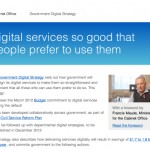Archive for November 10th, 2012
Saturday, November 10th, 2012

Cllr Sue Arnold, Michael Gove MP, Colin Bryan (Drayton Manor), Michael Fabricant MP
Local Conservatives joined Party members from Lichfield last night, Friday 9th November, at the Lichfield Conservative Association’s annual dinner where The Rt Hon Michael Gove MP, Secretary of State for Education, was the guest speaker.
The well-briefed Secretary of State was more than a match during the Q & A session, which followed the meal at Drayton Manor, treating the audience to a roller-coaster ride, which included amusing anecdotes at Labour’s expense. He asked, “Do you want Labour back with Ed Balls and Miliband at the wheel.”
He compared David Cameron’s current term of office with the “difficult days” of Maggie Thatcher’s first term as prime minister from 1979-83.
“Her government was deeply unpopular mid term and 20 points behind Michael Foot in the polls. She was taking tough decisions which were making a difference, but not making friends.”
He said the Coalition Government had created one million new jobs last year in the private sector and was also tacking the “benefits’ scandal.”
When asked about suggestions that playing fields of Britain were to be “sold off”, he said he wanted to carry on seeing his seven-year-old son participate in sport on a “playing field near his home.”
He added, “I love sport! I like to win but hope everyone can ‘lose with dignity“.
Pushing the right buttons with his audience, Mr Gove said there must be a return to teaching schoolchildren in Britain about our history where there is a “pride in our past” and not a “bias against facts and knowledge” and was still in firmly in favour of schools run on religious lines.
On the deeply divisive question of wind turbines, he called for a continuing mix of power including nuclear, gas and renewable.
He saved his biggest praise for Lichfield MP Michael Fabricant, celebrating 20 years in the House of Commons, describing him as “simply wonderful.”
Saturday, November 10th, 2012
 Christopher Pincher MP has made clear his objection to the proposed wind turbine near the Letocetum Roman site in Wall.
Christopher Pincher MP has made clear his objection to the proposed wind turbine near the Letocetum Roman site in Wall.
In response to the application for the proposed wind turbine at Wall Mr Pincher said, “I support renewable, clean energy however I do have concerns about the economic viability of many on-shore wind turbines, including the proposal for Wall. The turbines are subsidised with money from the pockets of the hard working families whose homes will be blighted by this massive windmill.
“Wall is a beautiful part of the world and it should not be spoilt by a turbine when it is not clear that on-shore wind power built by foreign companies provides any significant economic benefit to Britain nor when carbon-emitting gas-fired power stations have to sit in reserve to switch on when the wind does not blow.”
Mr Pincher is an active campaigner against the construction of inappropriate wind turbines and is one of the 105 MPs who wrote to the Prime Minister earlier this year asking that the subsidy provided to on-shore wind development be cut “dramatically”, so they will only be built in areas where the wind blows sufficiently to make them economically viable. Thanks to the lobbying of these MPs, the Government reduced the subsidies offered to new developers of wind turbines by 10%.
Mr Pincher has also written to Litchfield district council and local government Minsters about the inappropriate placement of wind turbines including the site at Wall and proposals for a similar wind farm near Clifton Campville.
Saturday, November 10th, 2012

Cllr Ian Parry
Staffordshire’s Conservative Party County Councillors have reacted to a union-commissioned report about county council plans to protect thousands of jobs and safeguard education support services.
Speaking about a report by the Association for Public Service Excellence (APSE), Ian Parry Cabinet Member for Education, Finance and Transformation said, “We understand union concerns and we appreciate being given the report, which has been put together by a local government funded body with an interest in public sector delivery of services. At first glance, we feel confident that all the issues raised have already been addressed, but we will obviously look at it in more detail before the final decision is made.
“But on the face of it, the report does not seem to raise anything new. We have been working on this project for over a year and since the very beginning have been working to make sure we listen to the views of our employees, schools, residents, unions and staff.
“We have already carried out a strategic options appraisal as the report suggests, which has informed every stage of the project. The findings of this appraisal will be discussed at our public county council cabinet meeting in December.
“In addition, our business case was independently scrutinised by KPMG, and it speaks volumes that two of the biggest companies in the UK, Carillion and Capita, following their own thorough assessment of the business and the proposed model are interested and excited enough to bid.
“This is about safeguarding jobs and protecting services so we can continue to provide the best education for the county’s children and young people now and in the future. We have said all along that this joint venture will be based in Staffordshire, and will bring jobs and prosperity to Staffordshire people.
“We are fully aware of the size and scale of this project, which is why once it comes to fruition; it will have taken the best part of 2 years. The risks of this project have been scrutinised at every step, with the project on the agenda of no less than 5 public council meetings since the announcement in March.
“We will not be pausing this process. We have full confidence in the business case and remain committed to deliver an innovative solution that will ultimately safeguard jobs in Staffordshire in the future. By combining our knowledge and expertise in delivering services to schools with the commercial acumen of the private sector we will be better able to compete in the marketplace and to ensure the very best services for the children, young people and schools of Staffordshire.”
Saturday, November 10th, 2012
 Following the Dementia Challenge progress report, and the launch of the Dementia Friends programme, the government has announced a number of measures as part of the next phase of the Dementia Challenge.
Following the Dementia Challenge progress report, and the launch of the Dementia Friends programme, the government has announced a number of measures as part of the next phase of the Dementia Challenge.
These measures will build upon the steps already taken to help the 800,000 people currently living with dementia in the U.K., and include:
£9.6 million for dementia research This is to fund the expansion of the UK Biobank to include 8,000 brain scans, to help scientists discover why some people develop dementia and others do not.
Extra support for GPs on dementia This is to better equip them to spot and diagnose dementia, and to help people with dementia and their carers to manage the condition. There will be a dementia toolkit for surgeries, and a requirement on health care professionals to ask patients aged between 65 and 74 about their memory as part of every standard health check.
Pilot with schools and youth projects This ambitious pilot will help young people across the country become dementia aware, helping students understand more about the condition. The aim is for the pilot to be expanded into a nationwide programme.
£1 million prize fund for ways to increase diagnosis Funding will be awarded to NHS organisations that find groundbreaking ways to drastically reduce the number of people with dementia who are undiagnosed by health care professionals.
A £50 million fund for environments designed for people with dementia This funding is to create areas in care homes and hospitals that help to reduce anxiety and distress in people with dementia, and help them feel safe.
A commitment on information for people diagnosed with dementia Every person diagnosed with dementia will be able to obtain detailed information on services and support, as part of the Our Health online service directories, which currently covers the South West of England and will be rolled out across England by the end of March 2013.
42 organisations signed up to the Dementia Care and Support Compact The 42 signatories to the compact represent 1,800 care services committing to standards of care and treatment for people with dementia.
Find out more about these and other initiatives and achievements on the Dementia Challenge website.
Saturday, November 10th, 2012
 The taxpayer is on course to save billions of pounds following the publication of the Government Digital strategy, which sets out how government services will be made easier to access online.
The taxpayer is on course to save billions of pounds following the publication of the Government Digital strategy, which sets out how government services will be made easier to access online.
The Digital Strategy sets out how the Government can make up to £1.2 billion worth of savings by 2015 simply by making everyday transactions digital.
By making it easier for people to do things like pay their car tax, book driving tests, complete tax returns, or apply for their state pension online, the Cabinet Office estimates that it could deliver £1.7 billion a year in savings beyond 2015.
Government handles over a billion different transactions every year through 650 different services. Many of these transactions do not yet have digital options, and the digital options that do exist are often underutilised. The strategy sets out how Government will make digital services so good that they will become the preferred option.
The publication of the strategy follows the successful launch last month of the single domain for Government, gov.uk, which makes accessing Government information simpler, clearer and faster for citizens and business.
Today’s strategy also sets out plans to improve digital skills across the Civil Service, which have been lacking. All departments will now need to have a digital leader on their executive boards.
Minister for the Cabinet Office, Francis Maude, said, “Britain is in a global race and that’s why we need to have modern, efficient, digital-by-default public services that are fit for the 21st century.
“Building world-class government digital services will take time but the publication of this strategy just a fortnight after the launch of gov.uk is an important milestone. I’d like to pay tribute to the work of civil servants in the Government Digital Service and beyond who have shown how Whitehall can improve and adapt by embracing new ways of working.
“Digital services are much more convenient because they can be accessed whenever you want them. They are also much more efficient, saving taxpayers’ money and the user’s time. Online transactions can be 20 times cheaper than by phone, 30 times cheaper than face-to-face, and up to 50 times cheaper than by post.”
The seven Whitehall departments that handle the majority of central government service transactions will be the first to start redesigning their services. By the end of 2012, each of these departments will identify three significant services, with over 100,000 transactions a year, for digital transformation.
Additionally, all new or redesigned transactional services going live after April 2014 from any department will have to meet a new Digital-by-Default service standard.
Visit the Cabinet Office website for more information. The strategy is available to read in full here.







